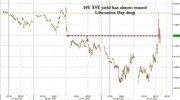Ricardo Hausmann - Convinced of an easy victory, Donald Trump has launched a global tariff war aimed at reducing the US trade deficit. But while Trump is focusing on imported goods, he is overlooking the far more important role played by services, intellectual property and investment in maintaining the United States' global economic dominance.
In August 1914, Europeans attached little importance to the century of peace that had followed Napoleon's defeat at Waterloo. As historian Barbara W. Tuchman recounted in her 1962 book ‘The Guns of August’, public opinion in Berlin, Paris, London and Vienna was swept up in a wave of collective euphoria - a feverish excitement about the expected benefits of a swift and decisive world war. The result was four years of misery and devastation. A similar sense of misguided bravado seems to pervade the administration of US President Donald Trump as it continues its reckless assault on the global security and trade order of the last 80 years. Convinced of an inevitable and easy victory, Trump has unilaterally declared war on the post-war order, ignoring the lesson of Field Marshal Helmuth von Moltke the Elder, military architect of Prussia's victory over France in 1870-1871: ‘No battle plan survives first contact with the enemy’.
On the face of it, the United States looks well placed to win Trump's trade war against China and its major trading partners such as Canada, Mexico and the European Union. In his public speeches, Trump often emphasises the large US trade deficit in goods, which reached a record $1.2 trillion in 2024. In his view, this trade deficit is irrefutable proof that the United States is being treated ‘very, very unfairly and very badly’.
Because it imports more than it exports, the US has more foreign goods to tax than exports vulnerable to retaliation. Trump intends to exploit this strategic advantage by using tariffs - the ‘most beautiful word in the dictionary’, as he once put it - to pressure companies based in Canada, Mexico and China to relocate production to the US, thereby eliminating the trade deficit. Given that most of America's trading partners depend on access to the US market, Trump believes he can wield his economic might and force his rivals into submission.
But trade is not a battlefield, and economic influence in one area does not necessarily translate into easy victories elsewhere. The fundamental flaw in Trump's strategy is that it focuses on the trade deficit in goods, neglecting the far more important role played by services, intellectual property and investment in the global economy. This short-sightedness leaves the US vulnerable to countermeasures that could undermine the very benefits it takes for granted.
The standard critique of Trump's trade agenda is that sooner or later he will recognise that producing goods in the US raises costs, harms consumers and erodes the competitiveness of US exports. But this argument overlooks a crucial detail: the United States' economic ties with the rest of the world extend far beyond goods. Services and investment are just as important, if not more so. And if this is where its potential advantages and vulnerabilities lie, there is little reason for other countries to retaliate with tariffs.
In particular, the US has a considerable surplus in the services sector, reaching $278 billion in 2023, thanks to sectors such as finance, telecommunications, digital trade, high value-added business services and the licensing of US patents and copyrights. And even this figure only reflects direct US sales to foreign consumers. In reality, most major US companies operate abroad through foreign subsidiaries. In 2024, profits from foreign operations totalled $632 billion. Once these profits are taken into account, the US invisible trade surplus approaches $1,000 billion.
What's more, US companies such as Apple, Google, Microsoft, Facebook, Nvidia, Johnson & Johnson and Tesla use their innovation-based market power to extract rents from consumers and businesses around the world. If these companies were hit with the equivalent of tariffs, they would not be able to pass on the cost to their foreign customers. After all, if they could raise their prices without losing profits, they would have done so already.
If we multiply the profits of US companies abroad by 26 - the average price/earnings ratio of S&P 500 companies - the value of US investments abroad can be estimated at $16.4 trillion. By contrast, foreign companies operating in the United States earned just $347 billion in 2024. In fact, the US surplus in services and foreign equity income almost offsets its trade deficit in goods. This makes its $16.4 trillion in foreign assets a far more attractive target for retaliation than tariffs on US exports.
The United States' dominance of technology and intellectual property (IP), which underpins its massive surplus in the services sector and its stock market earnings, is no accident. It has its origins in the post-war international order, in particular in the great compromise reached by the international community in 1994 during the so-called Uruguay Round of trade negotiations. Under the terms of the resulting Agreement on Trade-Related Aspects of Intellectual Property Rights (TRIPS), developing countries undertook to enforce the IP protections of advanced economies in exchange for market access.
As recent studies show, TRIPS has imposed significant costs on most developing countries. Yet they have accepted it as the price of gaining better access to Western markets. But if the US is now seen as reneging on its share of the market, why should emerging economies respect theirs? Many countries would be encouraged to challenge TRIPS, or even to coordinate their efforts to weaken it or abandon it altogether, thereby jeopardising intellectual property-intensive sectors such as technology, pharmaceuticals and entertainment...

